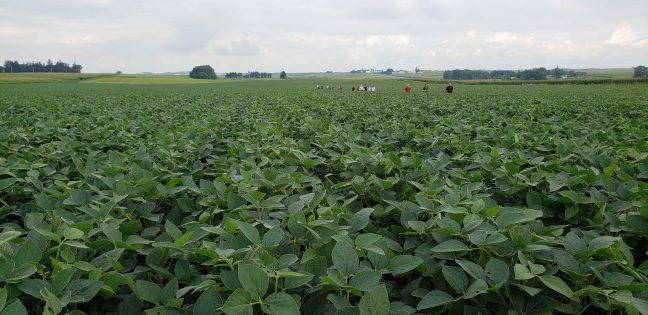The COVID-19 pandemic created a host of supply chain complications for the University of Wisconsin’s swine program, leading to a creative partnership benefitting local communities.
After the Tyson Fresh Meats plant in Waterloo, Iowa shut down April 22, UW’s swine program no longer had an outlet to sell their pigs to, said Jamie Reichert, manager of the UW swine facility at the Arlington Agricultural Research Station.
But instead of letting these pigs go to waste, Reichert said, UW swine distributed around 45 surplus hogs to state food pantries with the help of Vita Plus, a Madison-based animal feed and technology company.
This partnership hatched after a virtual meeting regarding UW’s new Meat Science and Animal Biologics Discovery Building, Reichert said.
Vita Plus Vice President Al Gunderson, who participated in the call, reached out to Department of Animal and Dairy Sciences Professor and Extension Meat Specialist Jeff Sindelar in regards to UW’s surplus pigs. After launching Serving Customers and Rural Communities, a project to put $100,000 into rural food security initiatives throughout the Upper Midwest, Vita Plus had the funding to buy some of the university’s hogs, Gunderson said.
Farmers speak out about financial aid received from federal government
“When I heard that they were having problems getting their hogs marketed because the normal spots weren’t taking them, I said to Jeff, ‘Hey, I have an idea here,’” Gunderson said. “‘If you guys could harvest those hogs, we could maybe turn them into usable pork for some of these food pantries like we are doing with our SCRC program.’”
SCRC targeted smaller, rural organizations that tended to struggle more with the pandemic because they had fewer resources and a low-profile, Gunderson said.
COVID-19 restrictions halted the work undergraduate students could do on-site and limited the university’s capabilities, Reichert said. So while the university could turn the hogs into carcasses, they could not process them into the familiar cuts like chops, sausage and brats necessary for the food security initiatives.
“Our bottleneck was that we only needed a handful of people to harvest the animals, but it gets really labor intensive when cutting and processing the meat,” Reichert said. “Because we couldn’t hire the undergraduates to do it, we didn’t really have anyone to do that part.”
According to Reichert, after the large processing plants like Tyson shut down, everyone turned to the local butchers, who became quickly overwhelmed. But Gunderson found Jerry Stoddard at Stoddard’s Meat Market in Cottage Grove, who wanted to help finish the processing.
After connecting all the dots, the three-way partnership began with two 15-pig harvests in May, Sindelar said. First, the Department of Animal and Dairy Sciences’ Meat Science and Muscle Biology Laboratory harvested the university’s pigs from the Arlington station. Then, Stoddard and his employees picked the carcasses up from the MLB to bring back to Cottage Grove for processing.
From there, Dave Henning and Margerie Stieve from Vita Plus picked up the frozen pork from Stoddard’s to deliver to food pantries within a 75-mile radius of Madison, including those in Beaver Dam, Waupun, Lodi, Mount Horeb, Lake Mills and New Glarus, Gunderson said.
Sindelar said the last of three harvests marked around 8,700 pounds of pork distributed to state food pantries June 29.
Berkely professor discusses research into food sustainability
“I think the rewarding thing, especially today, is that you could see that people can come together and work for a common cause no matter their backgrounds or interests to help other people,” Gunderson said. “I think that’s the thing that if we could all remember, maybe we can get through this.”
According to Sindelar, the harvests also marked an ending of a chapter for UW-Madison’s Department of Animal and Dairy Sciences, which just got a new building. These harvests were the last to take place in 90 years of the old MLB being operational.
Sindelar said the equipment used for the last harvest was moved into the new MSABD building later that week.
“In about a month, we will be starting up operations over there, so we are transitioning from our old program … and turning the chapter with a brand new facility, which is very much state of the art and should give us another 90 or so years of life,” Sindelar said.
UW graduate student pushes to alleviate student food insecurity
Sindelar said photos and videos of the MLB that were shot after the last harvest will be distributed to about 2,500 alumni, people who worked in the facility and students who went through the program to earn their degrees.
The old facility was home to many great discoveries and people who put UW-Madison’s Meat Science program on the map, Sindelar said. Every year since the MLB first opened in 1930, the program has given back to the community through research, discovery and education.
“To end on a note of doing something that is purely for the betterment of others is, I think, a really nice way to close things out,” Sindelar said. “I couldn’t imagine a better, more appropriate way.”


















